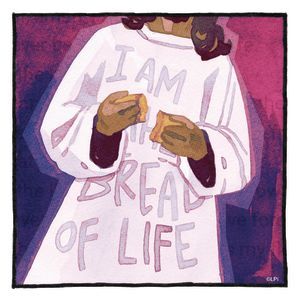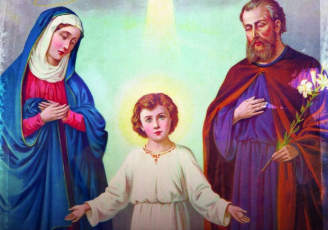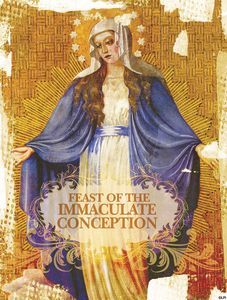Beloved Family:
I would like to build upon my article from last weekend, wherein I cited the address given by Sheila Walsh at the Friends for Life Banquet—how she reminded us that Jesus has commissioned us all to be lights of hope and love in the midst of the darkness of confusion, fear and despair. The following text is an article available from the Respect Life site of the United States Conference of Catholic Bishops. It takes a cue from the Eucharistic Revival and is titled: I Came So That They Might Have Life:
During the Easter Vigil liturgy, the single flame of the Easter candle shines through the darkness. That small flame spreads as each person’s candle is lit and the light of Christ is shared with others. Before we know it, the entire Church is ablaze with the warm glow of candlelight and the darkness has been vanquished.
We are each called by God to be that light of Christ that breaks through the darkness. We are called to be his disciples, continually transformed by our encounter with him and sharing in his mission. Jesus came that we might have life.
Part of the impetus for the Eucharistic Revival was a concern that some Catholics do not believe, or at least do not understand, that Jesus is truly present in the Eucharist. Even though our human senses perceive bread and wine, the Eucharist is Jesus—body, blood, soul, and divinity. Similarly, many people do not realize or acknowledge the sanctity of human life when it is hidden in the womb. Both instances call for us to help others recognize these sacred gifts that may not be perceivable through our human senses. We need to help others understand that just because something may not be apparent to our eyes does not mean that it is not there or that it is not important.
We live in a society that rejects those who are weak, fragile, or vulnerable. Yet, it is precisely within these conditions that a person is most in need of our care and protection. Pope Francis reminds us that “every child who, rather than being born, is condemned unjustly to being aborted, bears the face of Jesus Christ, bears the face of the Lord, who even before he was born, and then just after birth, experienced the world's rejection.” [1]
The U.S. bishops have affirmed that, while it is important to address all the ways in which human life is threatened, “abortion remains our pre-eminent priority as it directly attacks our most vulnerable brothers and sisters, destroying more than a million lives each year in our country alone.” [2]
Pope St. John Paul II wrote, “we are facing an enormous and dramatic clash between good and evil, death and life, the ‘culture of death’ and the ‘culture of life’. …we are all involved and we all share in it, with the inescapable responsibility of choosing to be unconditionally pro-life.” [3]
In the face of challenges such as abortion and physician-assisted suicide, we may feel that we are not equal to the task of overcoming the darkness. Yet, we are not alone. Jesus tells us, “I am with you always, until the end of the age” (Matthew 28:20).
The God who became man to save us still dwells among us. For Christ is “the light [that] shines in the darkness, and the darkness has not overcome it” (John 1:5). He is the one who overcame death and continually raises us to new life. He remains close to us always, seeking us out in each moment of our lives.
Jesus gave his very flesh to give us the gift of eternal life and invites us to the most profound experience of this gift in our celebration of the Eucharist. When we meet Jesus in the Eucharist, this encounter has the power to change us. The Eucharist has the power to transform the depths of our hearts and the heart of our culture. United to the power of his Eucharistic Presence, may we work to ensure that each person has life—and has it in abundance.
[1] Pope Francis, “Address of Holy Father Francis to Participants in the Meeting Organized by the International Federation of Catholic Medical Associations,” September 20, 2013 (Vatican City: Libreria Editrice Vaticana, 2013).
[2] Forming Consciences for Faithful Citizenship: A Call to Political Responsibility from the Catholic Bishops of the United States, Introductory Letter, p. 8. (Washington, D.C.: United States Conference of Catholic Bishops, 2024).
[3] Pope John Paul II, Evangelium vitae, (Vatican City: Libreria Editrice Vaticana, 1995), no. 28.
Let His Peace be with you,
Fr. Stephen













